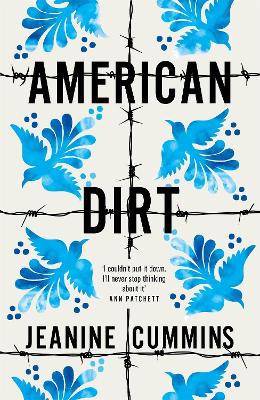
**Jeanine Cummins' new novel Speak to Me of Home is available to pre-order now**
*NOW A BBC RADIO 4 BOOK AT BEDTIME*
'Breathtaking... I haven't been so entirely consumed by a book for years' Telegraph
'I'll never stop thinking about it' Ann Patchett
FEAR KEEPS THEM RUNNING. HOPE KEEPS THEM ALIVE.
Vivid, visceral, utterly compelling, AMERICAN DIRT is an unforgettable story of a mother and son's attempt to cross the US-Mexico border. Described as 'impossible to put down' (Saturday Review) and 'essential reading' (Tracy Chevalier), it is a story that will leave you utterly changed.
Yesterday, Lydia had a bookshop.
Yesterday, Lydia was married to a journalist.
Yesterday, she was with everyone she loved most in the world.
Today, her eight-year-old son Luca is all she has left.
For him, she will carry a machete strapped to her leg.
For him, she will leap onto the roof of a high speed train.
For him, she will find the strength to keep running.
- ISBN10 1472261399
- ISBN13 9781472261397
- Publish Date 21 January 2020
- Publish Status Out of Print
- Out of Print 11 December 2024
- Publish Country GB
- Publisher Headline Publishing Group
- Imprint Tinder Press
- Format Hardcover
- Pages 480
- Language English
Reviews


clq
I'll let my review stand, and I can't deny my feelings toward the book as I was reading it and after I read it, but I also can't and don't deny that my lack of knowledge, experience, and culture might well be a prerequisite for having enjoyed it.
----------------
I loved American Dirt. I really, really, loved it. It’s one of the most engrossing, emotionally jarring, moving, exciting books I’ve read in a very long time. It’s brutal, sad, and provocative, but it knew exactly what it’s doing, and it struck up all my emotional cords with a precision and relentlessness that, at times, literally took my breath away.
American Dirt is, put simply, a story about a woman who suddenly has to uproot her comfortable life to escape from Mexico along with her son. She’s on the hit-list of a cartel, and she needs to get away from where they can get to her, which means getting out of Mexico, which means going to The North, i.e. to The United States. This makes her a migrant, or, from the point of view of the United States, one of the many immigrants who try to illegally cross the border from Mexico to the United States. This is the story of her journey.
From the first page, the book did a fantastic job at creating a sense of urgency that felt immediate, real and desperate. In just a couple of chapters, this book managed to set out the stakes, and make me feel more invested in what was going on than most books achieve by the time I’ve finished them. The book is truly a page-turner, and at times I found myself accidentally skipping over lines in a hurry to find out what would happen next. It is, overall, pretty bleak – which is appropriate given the subject matter – but there are enough glimpses of light, of optimism, and of goodness that the contrasting devastation brought on by the downturns becomes all the more effective.
Most things in this story are ambiguous, from the situations, to the characters, to the choices they make. Where a story like this could have been in danger of becoming a “follow the characters from A to B” kind of affair, where one essentially just waits to see what happens along the way, this story doesn’t even approach that. Nothing feels certain, no one feels safe, every situation has the real potential to be something other than what it seems like, and I wasn’t able to read this book without constantly feeling tense. Despite this story being fictional, it’s easy to believe (in fact, it’s impossible not to believe) that situations like the ones in the book are very real. It presents situations, dilemmas, and choices that most of us will never be in and never have to confront. The book strikes a wonderful balance between presenting these events, almost casually, as the relatively unexceptional events that they really are, while at the same time making the reader extremely uncomfortable. It all feels brutally real, it all feels brutally honest, and the reader has no choice but to confront these fictional realities. Another thing that really struck home was what impact small kindnesses, small wins, and relatively small gestures can have on people who are desperate. How much a little of anything can mean to someone who has nothing.
There are a couple of reasons I see why some might find the book problematic. I’m sure some would say that the book is political, making political points, and get turned off by that. I’d vehemently disagree. The story is about a person going through something that to most people seems extreme, but which will be the lived reality for many. The story humanises and gives a voice to a fictional person trying to immigrate, illegally, yes, to the United States. Regardless of ones views on illegal immigration to the United States, or to anywhere, stories like this are still important. It’s uncomfortable to think about the fact that preventing people from illegally entering a country may result in them dying in a desert, may result in them getting killed, raped, or otherwise abused in the places they are escaping from. Sure, this won’t be the case for everyone, but it will definitely be the case for someone. Regardless of political positions on how one should treat illegal immigrants, the fact is that they are human beings. This is way too easy to forget, and this book is a powerful reminder. I believe it’s unreasonable to have any position at all without acknowledging, and at least considering, the fact that even mild, agreed upon, anti-immigration measures has a human cost to someone.
That said, this book does a good job of not preaching to the reader. It has a lot of nuance, and doesn’t try to make a point that everyone attempting to cross the border are great people. In fact, with the single exception of a couple of pages that felt political in a way that jarred with the rest of the story, the book shows rather than tells. It paints a picture of the kind of thing that happens, and it’s up to the reader to feel or think whatever they want to feel or think based on that picture.
The other potential problem I see with this book is that the author is essentially appropriating the story, the desperation, and the tragedy of others, in order to tell a compelling , fictional, story. I can see why this might be problematic, but the author does address this point in the afterword. She acknowledges the potential problems of it, and lays out her case for why she felt that she should tell this story regardless. It boils down to the opinion that stories like these should be told is much as possible by as many as possible. It’s up to the individual reader to opine about that justification, but I’d encourage anyone to read the afterword before forming an opinion.
American Dirt may be an important book, a useful book, and a thought-provoking book, but whatever else it might be, it’s an incredibly gripping, well told, fantastic piece of storytelling. It’s uncomfortable, it’s sad, it’s visceral, and it’s brilliant. It’s the kind of book that, for me, serves as an example of how books can immerse the reader almost completely. I’m not sure I’d recommend this book to everyone – it really is quite heavy – but for anyone who wants to read the kind of story this book tells, this is certainly one of the best ones that I’ve read.
